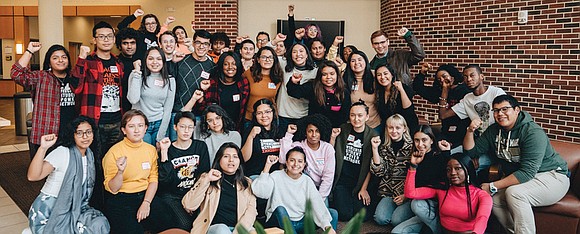Va. student network criticizes colleges reopening for in-person learning
George Copeland Jr. | 9/17/2020, 6 p.m.
Virginia students have leveled several criticisms against state colleges that chose to reopen their campuses for the fall semester in the midst of the COVID-19 pandemic.
During a virtual news conference Monday morning hosted by the Virginia Student Power Network, students from Virginia Commonwealth University, Virginia Tech, George Mason University and other schools shared details on how their semesters have gone so far.
They pointed to a number of issues that have emerged from the universities choosing to hold in-person classes and the methods colleges are using to combat the spread of COVID-19.
Their criticisms ranged from the mismanagement of freshmen students new to the college experience, to a lack of accommodations and resources for students and university workers, to college administrators being unwilling to address the flaws in their reopening plans and their potential impact on their local communities and the state at large.
Students have publicly lodged their displeasure in several ways, including VCU students holding a strike on the first day of classes to University of Virginia students and employees holding a 15-minute die-in on the Charlottesville campus.
“All in all, (reopening for in-person learning) was a really irresponsible choice that’s obviously driven by money,” said VCU student Taylor Maloney.
Further criticism has come from the VCU and GMU chapters of the American Association of University Professors over the efficacy of the COVID-19 self-test kits provided by a company called Kallaco to students and staff set to return to campus. It was later revealed that those initial kits have not been approved by the FDA for home use.
Less than a month after reopening, the effects of the reopening for in-person learning already are being felt.
An outbreak of more than 1,000 cases led James Madison University to join Virginia State University, Hampton University and others in closing the campus, becoming the first college to do so after the semester began.
Meanwhile, VCU and U.Va. officials are preparing more campus spaces for isolation and quarantine, having already seen more than 100 active coronavirus cases on their campuses.
In total, universities in the state have seen more than 2,100 positive cases of COVID- 19 so far, according to numbers reported by the schools.
Further complicating these cases is a lack of oversight, critics said, because the Virginia Department of Health did not review or approve any of the reopening plans. Local health departments then were left to oversee and review these plans at their own discretion.
Officials and authorities are aware of the connection between college reopening and the rising number of COVID-19 cases. At a news conference last week, Richmond Mayor Levar M. Stoney advised local college students to heed safety guidelines and avoid “mass gatherings at parties,” as clusters of positive cases began to rise in the city during the previous two weeks.
Speakers at Monday’s VSPN event acknowledged that some students haven’t followed safety guidelines. However, they also criticized the rhetoric from college authorities as shifting responsibility from the schools to the students—not for just the number of positive COVID-19 cases and the furlough of workers, but also the work of monitoring students to ensure guidelines are being followed.
“I wish they showed more consider- ation and care for the human beings that are directly impacted by their careless choices,” said VSPN Director Ibby Han, reading a letter from an anonymous GMU sophomore. “They need to do better,” the letter stated. “We deserve better.”
In addition to these testimonies, speakers also shared potential solutions, including using college funds from endowments, investments and other revenue sources to ensure hazard pay for campus workers, online education resources for low-income students and a three-year tuition freeze. Some of these initiatives already being advocated by college student groups, along with a call for all-online instruction.
Speakers also urged university officials to listen to their students, faculty and workers. And they urged students, whether learning on campus or online, to follow COVID-19 safety guidelines.






